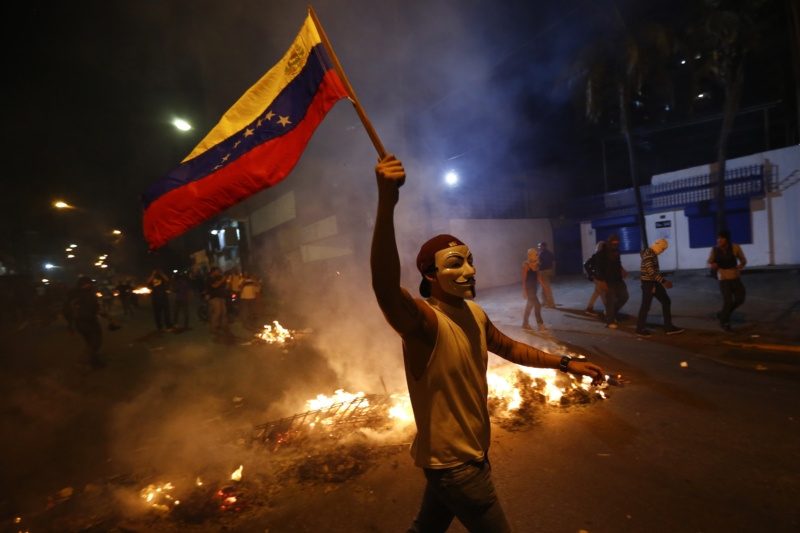Obama & Latin America: New Beginnings, Old Frictions
Today, signs of frustration are unmistakable in Washington and in many Latin American capitals, despite Obama’s immense personal appeal and the continued promise of a more productive partnership.
The Trump administration on Monday announced new sanctions against Venezuelan President Nicolás Maduro, a day after the country held highly contentious elections to elect members to a Constitutional Assembly charged with rewriting the constitution of former President Hugo Chávez. The election, decreed by Maduro, comes after months of violent protests that have left hundreds dead or imprisoned while millions suffer under extreme food shortages and excessive inflation. International observers widely question the vote’s legitimacy, arguing this is Maduro’s latest attempt to strip away any remaining vestiges of democratic institutions.
On this week’s second episode of The E.R., FP’s executive editor for the web Ben Pauker is joined by Juan Gonzalez and Michael Camilleri to discuss the historical context of the current crisis and the political and economic implications for the United States. With a crumbling economy and little public support, does Maduro have the resources to remain in power? Is there any chance of a peaceful transition?
“Venezuela is a country that for many years was a close friend of the United States. The supposedly largest oil reserves in the world meant that there was a lot of US investment, cross cultural exchange, and people to people ties between the US and Venezuela. More recently it became more of the opposite – Chavez was this anti-imperial, anti-US figure and for a time coalesced a movement in Latin America and more broadly.”
“Looking at the situation today we clearly have economic interests, security interests, humanitarian interests and a broader interest to preserve the Americas as a bastion for democracy, with the exception of Cuba, of course.”
“If we think worst case scenario in Venezuela – state collapse, maybe a failed state - we are looking at a major humanitarian catastrophe, major migration or refugee flows, and a heaven for all sorts of organized crime. This would be a major destabilization for the broader region.”
“When the Obama administration did this first round of individual sanctions in 2015 there was a real backlash from the region. There is a history of US-heavy handedness in the region, so anytime that the US does something unilaterally it is potentially difficult diplomatically for us. These sanctions came a month or two before the Summit of the Americas in 2015, it was going to be a triumphant moment where Raul Castro and President Obama were going to meet for the first time in person following the announcement of the normalization of relations […] and it was threatened and undermined by the response to US-sanctions to Venezuela.”
“The opposition is often accused of being disunited, divided and ineffective. In the past the made strategic mistakes, […] but I think in the recent years they have come a long way. It is still a gamut of parties that expand the ideological spectrum, and there may not be a thing that they agree on except the fact that Maduro has to go, that elections have to take place, and that the constitution of the country needs to be respected. Frankly, right now, that is enough – it is a meaningful agenda. What comes next will be really complicated; I wouldn’t want to be the person that comes next in Venezuela after Nicolas Maduro, whenever that happens.”
“The asamblea constituyente can suspend the current constitution, which is Hugo Chavez’s 1999 constitution. They can suspend that even while they are writing the new one, there is no time frame for this. They can immediately start taking measures that would undo whatever democratic institutionalism remains in the country. Maduro has been very clear about what his plans are. The first is going after opposition leaders, which we have already seen happening after these arrests or re-arrests in the last couple of days, The second is going after the two entities which he does not currently control – the national assembly, where the opposition has the majority, and the attorney general, who has gone rogue and has become very critical in the last few months. If Maduro has his way, this constitutional assembly will be the way for him to take these institutions that are standing on his way and for him to consolidate this one-man one-party rule.”
[…]
Today, signs of frustration are unmistakable in Washington and in many Latin American capitals, despite Obama’s immense personal appeal and the continued promise of a more productive partnership.
Despite continued tensions among the Andean countries, four U.S. ambassadors painted an encouraging picture of regional stability.
Even with loaded dice, Chávez may be running scared. What to do to preserve power? That’s all that has ever mattered.
 ビッグアップジャパン / Flickr / CC BY-SA 2.0
ビッグアップジャパン / Flickr / CC BY-SA 2.0